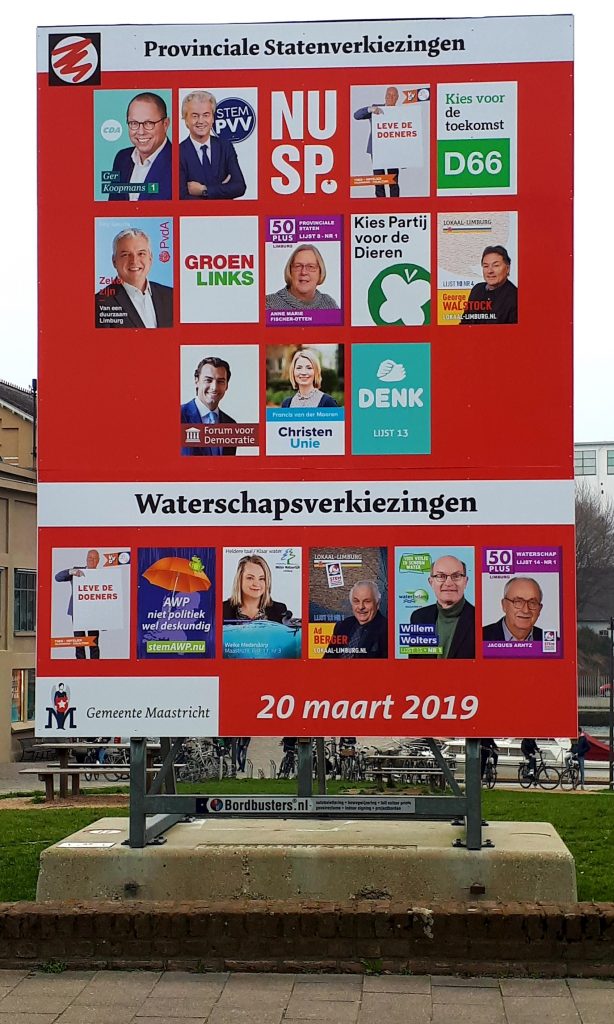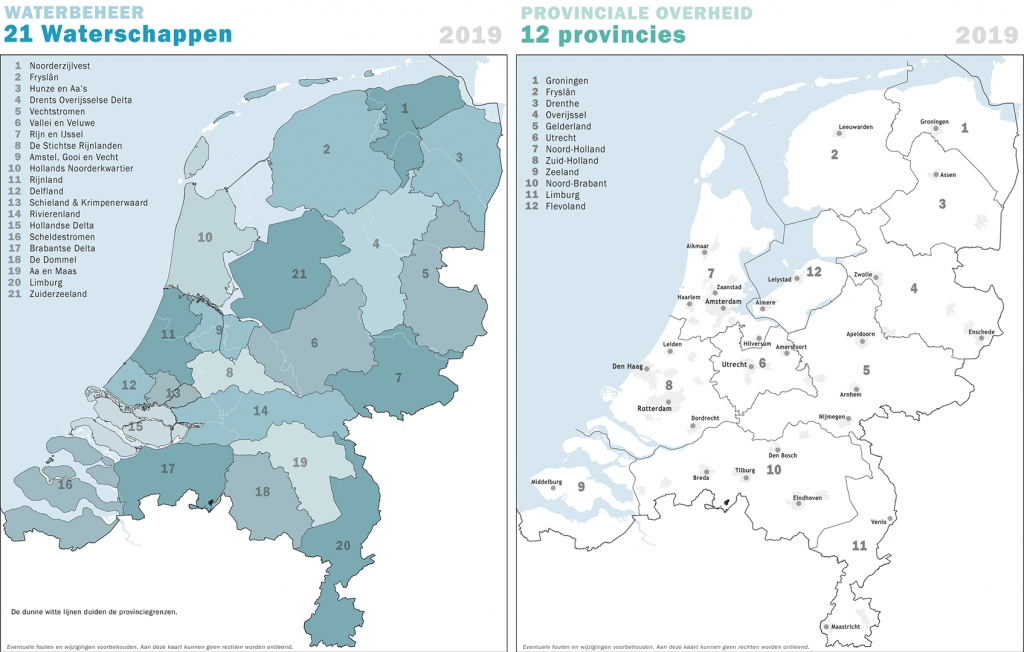Big Surprises In The Dutch Provinciale Statenverkiezingen Posted by Sten on Mar 25, 2019 in Culture, Dutch Vocabulary, News
Last Wednesday, thousands of stemgerechtigden (voters) flocked to the hundreds of stemlokalen (polling stations) all over the country to cast their stem (vote). Or, perhaps, the plural stemmen is more apt, as the Dutch actually had two verkiezingen (elections)! One vote for the waterschapsverkiezingen (water board elections) and the other for the Provinciale Statenverkiezingen (Provincial States elections). Today, the official results will be published. What do these elections mean for the Netherlands? And who won? Who lost? Let’s find out.
What were the elections about?
The waterschapsverkiezingen decide who is going to lead the waterschappen in the coming four years. The waterschappen are responsible for water management, which of course is a big deal in the Netherlands. And while this seems quite simple – to just make sure that our feet stay dry – there is more to it than you may think. A high water level allows nature to thrive, whereas a low water level helps boeren (farmers). The waterschappen are also involved in the energietransitie (energy transition), as they own land that can be used to install windmolens (wind turbines) and zonnepanelen (solar panels). Money can be invested in more such solutions, or the budget can be cut to save the belastingbetaler (taxpayer) a few bucks. These are important political choices!
However, the waterschapsverkiezingen have never gained as much attention as the Provinciale Statenverkiezingen, as the latter indirectly determine the verdeling (distribution) of zetels (seats) in the Eerste Kamer (“First Chamber”, the Senate, or upper house, of the Dutch parliament). In fact, the reason that the waterschapsverkiezingen are held together with the Provinciale Statenverkiezingen is to generate a higher opkomst (turnout) for the waterschapsverkiezingen. Why do those elections suffer from a lower opkomst? Well, it may be that people are less interested in the waterschappen or simply do not know much about them. After all, direct voting of the representatives of the waterschappen at a national level has only existed since 2008. But the strategy to hold the verkiezingen simultaneously seems to be working: The opkomst for the waterschapsverkiezingen grew from 43.5 in 2015 to 50.5 percent this time around. The Provinciale Statenverkiezingen also saw a bump from 46 to 56 percent this year.
Just like in the gemeenteraadsverkiezingen, there are lokale partijen (local parties) and landelijke partijen (national parties) that participated in both verkiezingen held on March 20. There are different parties for the waterschappen and the Provinciale Staten.
Confusing borders
Wednesday’s elections were held in each of the 12 provincies and in each of the 21 waterschappen of the country. Every gemeente (municipality) set up stembureaus (polling stations) throughout the gemeente. The default stembureau is the one closest to your huisadres (home address), but you can vote in any of the stembureaus in the gemeente. That can be quite handig (handy) – but this can also cause problems. While the grenzen (borders) of gemeenten and provinces line up nicely, the waterschappen have differently drawn territories. This meant that some gemeenten held elections for multiple waterschappen! However, your vote only counts for the waterschap in which your home is. So if you voted in a stembureau outside of your waterschap, your stem was ongeldig! Luckily, this was quite an unlikely scenario.
So… Who won?
For the waterschappen, it was Water Natuurlijk (“Water Naturally”) that became the biggest party in the country, just like in 2015. As the name suggests, it is a waterspecifieke partij (water-specific party), so it is not in the race for the Provinciale Statenverkiezing.
And what about the Provinciale Staten?
The big surprise was Forum voor Democratie (FvD, Forum for Democracy), a right-wing party led by Thierry Baudet. It is the first time that the partij participated. With 13 zetels, it immediately became the largest partij in the Eerste Kamer. Baudet profiled his party as anti-establishment, distancing himself from the other parties. The party has strong stances on migration, the EU and climate change with nationalistic tones throughout. Disgruntled voters used to flock to the long-standing anti-establishment Partij voor de Vrijheid (PVV, Party for Freedom) of Geert Wilders. It seems that they are losing faith, as the PVV lost many voters to FvD. Baudet is the new kid on the block, which promises to blow a new wind into Dutch politics.
Another surprise was on the left: GroenLinks, the Green Left party led by Jesse Klaver, also gained a substantial amount over 2015, moving from 4 zetels to 9. He is primarily focused on the klimaatakkoord (climate agreement).
Both Klaver and Baudet want to change the status quo, and both do so with a populist narrative.
However, will they be able to really change things? In the end, due to the Dutch political system (and the famous poldermodel), both Baudet and Klaver will have to work together with other parties and find compromises. Will it be enough for their achterban (constituency)? We will see.
The big losers are the CDA, D66, PVV and SP, who all lost at least three seats compared to the verkiezingen in 2015. Also the government party VVD lost one zetel. It looks like populism is gaining traction in the Netherlands.
What do you think of these election results? Do you find them surprising? What do you think that they entail? Let me know in the comments below!

Build vocabulary, practice pronunciation, and more with Transparent Language Online. Available anytime, anywhere, on any device.






Comments:
Peter Simon:
The rise of populism here is not a big surprise to me (seems contagious…), the measure it has taken is, especially because I particularly value the multi-cultural peace in the Netherlands. But that is also threatened – from inside.
I keep fingers crossed that the Netherlands doesn’t go down the way Hungary has gone. Hopefully this model is a lot more durable and flexible than that one.